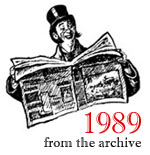
J.F. Powers’s Comic Art
ECCLESIASTICAL COMEDY AS DEEPENED COMEDY
At the beginning of J.F. Powers’s 1962 novel Morte d’Urban, Father Urban sees a coarse businessman as a possible benefactor for his impoverished order, the Clementines. Urban diligently cultivates his friendship, and later entertains the fantasy that the Church ought not be too strict in her dealings with the rich and powerful:
He was up against a situation that had often confronted the Church, and one that had cost her heavily in lives and property. Father Urban had given a lot of thought to this particular aspect of ecclesiastical history, which, generally speaking, suggested that it is too hard for some people, and all too easy for others, to do the right thing. Father Urban felt that Clement VII had been the wrong pope to deal with Henry VIII, and he wondered what the feeling was in heaven on this point.
A literary relative of Powers’s Father Urban is surely the Dean of Blangermont in George Bernanos’s masterpiece The Diary of a Country Priest, who believed it would be imprudent to judge too harshly the sharp business practices of the merchant class, the source of the French Church’s revenues and political support.
Powers’s Father Urban is an extroverted and energetic American priest (“an operator…a born operator”) who sprinkles his popular sermons with the idiom of American business: “[Charlemagne], you might say, owned and operated Europe.” He soothes a group of businessmen annoyed by a campaign, sponsored by Urban’s own superior, to “put Christ back into Christmas”: “As I see it, merchants — to mention only one group — are paying homage in the way best suited to them and their real talents.” “Naught for your comfort” isn’t one of Urban’s pastoral principles, not when he is ministering to the well-to-do and influential.
Father Urban also bears a certain literary resemblance to the whiskey priest in Graham Greene’s The Power and the Glory, who, before the persecutions in his Mexican province, had nurtured ecclesiastical ambitions beyond his well-run and comfortable parish. But Morte d’Urban is a comic novel, and it isn’t religious persecutions but an errant golf ball inexpertly driven by his bishop, whom Urban regards as one of his persecutors, that chastens Father Urban and transforms him at the novel’s end into, in Thomas Merton’s words, “a deeper, more noble and more spiritual” priest. Merton, in his review of Morte d’Urban, recognized that Powers’s novel was not just a satire on the American Church and its clergy but also “a valid and penetrating study of the psychology of a priest in what is essentially a spiritual conflict.”
You May Also Enjoy
We travel under the pretense of being receptive, really looking for what we think we already know. Yet we are occasionally genuinely surprised.
When reading great literature, especially the great books, we find the virtues of love and forgiveness front and center.
Poetry was once understood to be an anthropological episteme, a way of knowing, if only through a glass darkly.

